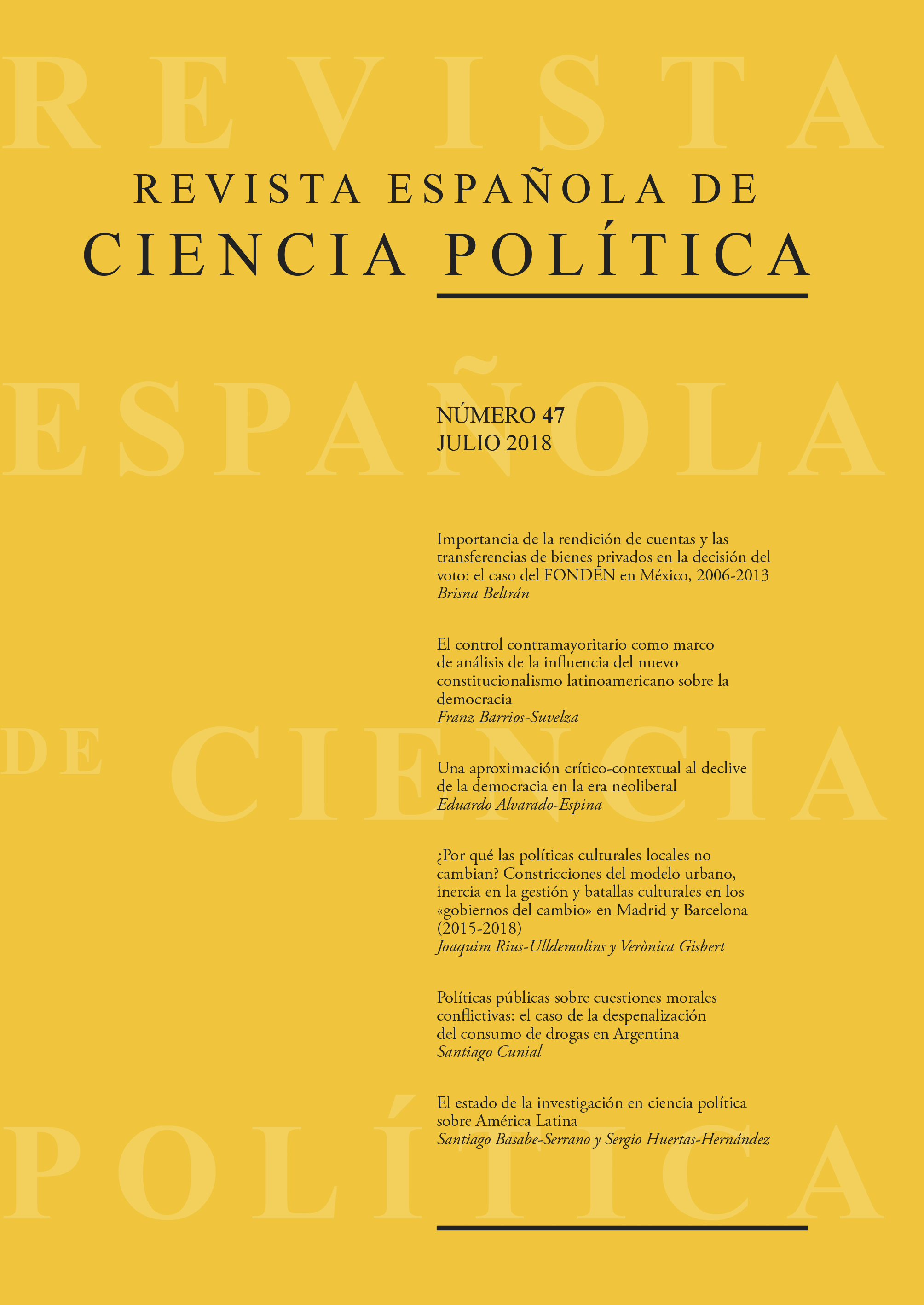The state of political science research on Latin America
DOI:
https://doi.org/10.21308/recp.47.06Keywords:
political science, Latin America, research.Abstract
This research analyzes the state of Political Science research with a focus on Latin America. To this aim, an unpublished database is presented containing articles published in Spanish and Portuguese journals that are included in JCR or Scimago indexes. First of all, the results show a discipline which is dynamic, theoretically plural, mainly inclined to the study of classic issues within the discipline, and with some methodological failures. On the other hand, it is confirmed the existence of very few journals where to publish, so the creation of specialized ones seems urgent. Furthermore, our empirical findings point out to the necessity of including both under-researched countries and relevant yet underexplored topics (e. g. corruption) in the research agenda. Finally, this work raises the urgency of promoting cooperation at institutional level.Downloads
References
Alemán, Eduardo. 2013. «Latin American Legislative Politics: A Survey of Peer-Reviewed Publications in English», Journal of Politics in Latin America, 5 (1): 15-36.
Altman, David. 2012. «Where is Knowdledge Generated? On the Productivity and Impact of the Political Science Department in Latin America», European Political Science, 11 (1): 1-17. Disponible en: https://doi.org/10.1057/eps.2010.82.
Barrientos del Monte, Fernando. 2013. «La Ciencia Política en América Latina. Una breve introducción histórica», Convergencia: Revista de Ciencias Sociales, 20 (61): 105-133.
Bates, Robert H., Avner Greif, Margaret Levi y Jean-Laurent Rosenthal. 1998. Analytic Narratives. Princeton: Princeton University Press.
Billordo, Libia. 2005. «Publishing in French Political Science Journals: an Inventory of Methodsand Sub-fields», French Politics 3 (2): 178-186. Disponible en: https://doi.org/10.1057/palgrave.fp.8200075.
Boncourt, Thibaud. 2008. «Is European Political Science Different from European Political Sciences? A Comparative Study of the European Journal of Political Research, Political Studies and the The Revue francaise de science politique, 1973-2002», European Political Science 7 (3): 366-381. Disponible en: https://doi.org/10.1057/palgrave.eps.2210185.
Bulcourf, Pablo, Enrique Gutiérrez Márquez y Nelson Cardozo. 2014. «El desarrollo de la ciencia política en Argentina, Brasil y México: construyendo una mirada comparada», Anuario Latinoamericano. Ciencias Políticas y Relaciones Internacionales, 1 (1): 155-184.
Bulcourf, Pablo, Enrique Gutiérrez Márquez y Nelson Cardozo. 2015. «Historia y desarrollo de la Ciencia Política en América Latina: reflexiones sobre la construcción del campo de estudios», Revista de Ciencia Política, 35 (1): 179-199. Disponible en: https://doi.org/10.4067/S0718-090X2015000100009.
Buquet, Daniel. 2013. Producción e impacto de las ciencias sociales en América Latina. Documento de Trabajo. Buenos Aires: CLACSO.
Easton, David. 1965. A Systems Analysis of Political Life. New York: John Wiley and Sons.
Easton, David. 1997. «Categorías para el análisis sistémico de la política», en David Easton (comp.), Enfoques sobre teoría política. Buenos Aires: Amorrortu.
Easton, David. 1999. Esquema para el análisis político. Buenos Aires: Amorrortu.
Elster, Jon. 1988. Uvas amargas: sobre la subversión de la racionalidad. Barcelona: Península, Ideas.
Gerring, John. 2004. «What is a Case Study and What Is Good For?», American Political Science Review, 98 (2): 341-354.
Kapiszewski, Diana y Matthew M. Taylor. 2008. «Doing Courts Justice?: Studying Judicial Politics in Latin America», Perspectives on Politics, 6 (4): 741-767. Disponible en: https://doi.org/10.1017/S1537592708081899.
Lieberman, Evan S. 2005. «Nested Analysis as a Mixed-Method Strategy for Comparative Research», American Political Science Review, 99 (3): 435-452. Disponible en: https://doi.org/10.1017/S0003055405051762.
March, James G. y Johan P. Olsen. 2008. Elaborating the «new institutionalism», en Sarah A. Binder, R. A. W. Rhodes, y Bert A. Rockman (eds.), The Oxford Handbook of Political Institutions. Nueva York: Oxford University Press.
McDermott, Rose y Peter K. Hatemi. 2010. «Emerging Models of Collaboration in Political Science: Changes, Benefits, and Challenges», PS: Political Science and Politics, 43 (1): 49-58. Disponible en: https://doi.org/10.1017/S1049096510990811.
Munck, Gerardo L. y Richard Snyder. 2007. «Who Publishes in Comparative Politics? Studying the World from the United States», Comparative Political Studies, 40 (1): 5-31. Disponible en: https://doi.org/10.1177/0010414006294815.
Norris, Pipa. 1997. «Toward a More Cosmopolitan Political Science?», European Journal of Political Research, 31: 17-34. Disponible en: https://doi.org/10.1111/ j.1475-6765.1997.tb00761.x.
Pehl, Malte. 2012 «The Study of Politics in Germany: A Bibliometric Analysis of Subfields and Methods», European Political Science, 11 (1): 57-70. Disponible en: https://doi.org/10.1057/eps.2011.38.
Peters, Guy. 2003. El nuevo institucionalismo: teoría institucional en Ciencia Política. Barcelona: Gedisa.
Polga-Hecimovich, John y Alejandro Trelles. 2016. «The Organizational Consequences of Politics: A Research Agenda for the Study of Bureaucratic Politics in Latin America», Latin American Politics and Society, 58 (4): 56-79. Disponible en: https://doi.org/10.1111/laps.12002.
Rapoport, Anatol. 1997. «Algunos enfoques sistémicos de la teoría política», en David Easton (comp.), Enfoques sobre teoría política. Buenos Aires: Amorrortu.
Riker, William H. 1962. The theory of political coalitions. New Haven y Londres: Yale University Press.
Sartori, Giovanni. 2005. Partidos y sistemas de partidos. Madrid: Alianza Editorial.
Downloads
Published
How to Cite
Issue
Section
License
Copyright (c) 2018 Santiabo Basabe-Serrano, Sergio Huertas-Hernández

This work is licensed under a Creative Commons Attribution-NonCommercial-NoDerivatives 4.0 International License.






